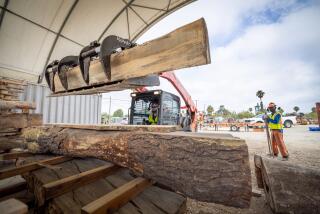Firm’s Plan to Curb Timber Cutting Called ‘Fairy Tale’
- Share via
SAN FRANCISCO — The co-chairman of a legislative hearing on forest policy Wednesday dismissed as a “fairy tale” a Pacific Lumber Co. suggestion that it eventually will drastically reduce its controversial mass clear-cutting of timber on California’s North Coast.
Assemblyman Byron Sher (D-Mountain View) accused a company official of trying to falsely comfort lawmakers by testifying that its rich stands of redwoods and Douglas fir trees will never be wiped out if it cuts back after 20 more years of heavy harvesting.
“You’re asking us to believe the unbelievable,” Sher told John Campbell, executive vice president of operations at Pacific Lumber in Scotia, 250 miles north of San Francisco.
He called Campbell’s assertion “totally unrealistic” because it assumes the company would return to a harvesting level well below the industry average.
Responded Campbell: “There is more than adequate timber being grown to sustain us into the future.”
The hearing, chaired by Sher and Sen. Barry Keene (D-Benicia) was the first of two prompted by concerns over the economic and environmental impact of the 1985 takeover of Pacific Lumber by Houston-investor Charles Hurwitz. Legislators are considering proposals to tighten state restrictions on timber harvesting.
Since the takeover, the company has stepped up its harvest to 248 million board feet a year from the previous 137 million board feet. Campbell acknowledged that a primary reason for the increase is the need for Hurwitz’s Maxxam Group Inc. to pay off massive debts incurred in the nearly $900-million acquisition.
Environmentalists and other critics contend that the extra tree-cutting in the world’s largest privately owned acreage of redwoods will devastate the ecology and local economy within five years.
Keene, who represents an area encompassing Humboldt County, where Pacific Lumber owns about 200,000 acres of redwood forest, said it’s too soon to say the takeover was harmful. But he assailed the corporate takeover and management of timberland without sufficient attention to the local impact.
“Manipulating the redwoods from Wall Street or Texas is like dropping bombs from a B-29 at 25,000 feet,” said Keene, chairman of the Senate Select Committee on Forest Resources.
“All the people of California depend on the forests--in rural California for jobs; elsewhere for affordable building materials, paper products and tax contributions,” he said.
Keene is the sponsor of a bill that would impose restraints to discourage purchase of timberland by corporations that would suddenly harvest great quantities of timber to pay for the purchase.
Campbell said Pacific Lumber’s timber harvesting practices are conservative in comparison to other timberland owners in California, particularly with concern to clear-cutting.
“In 1986, only 12% of the acres harvested were clear-cut, amounting to four-tenths of 1% of Pacific’s total acreage,” he said. “The volume from clear-cutting is expected to be about the same in 1987.”
While acknowledging that under current plans the old-growth redwoods would be virtually eliminated in 20 years, he said a massive replanting program will replace the forests. This year, 750,000 seedlings will be planted, including 500,000 redwoods, Campbell said.
He said the 20-year estimate for a continuation of current harvesting levels was picked by a consultant for the purposes of a study, but added that a cutback is likely in light of the industry’s cyclical nature.
Numerous opponents of Keene’s bill attended the hearing, including representatives of the timber and trucking industries.
“It’s a clear fact that statewide more timber is being grown than is being harvested,” said Matt Anderson of the California Forest Protective Assn., representing commercial timberland owners. “State control of harvesting decisions would instantly lead to loss of jobs by eliminating the flexibility necessary to respond to changes in the market.”
More to Read
Inside the business of entertainment
The Wide Shot brings you news, analysis and insights on everything from streaming wars to production — and what it all means for the future.
You may occasionally receive promotional content from the Los Angeles Times.










